|
1. CBS and ABC Lead by Hailing Hillary's Universal Health Care Plan
The CBS and ABC evening newscasts led Monday night -- even before O.J. Simpson -- by trumpeting Hillary Clinton's universal health care plan, a proposal fill-in CBS anchor Harry Smith insisted addresses a vital need: "It's a huge problem. An estimated 47 million are not covered." Of course, CBS didn't bother explaining how a significant number of those can afford insurance or are illegal aliens. ABC's medical doctor, Tim Johnson, who back in 1993 called Bill and Hillary Clinton "almost heroes in my mind for finally facing up to the terrible problems we have with our current health care system," praised Senator Clinton's new plan: "Every industrialized country in this world that is successful with health care...has a partnership between government and the private sector." CBS's Jim Axelrod asserted "Clinton doesn't remind reminding people of her past painful experience in health care reform" because "in the latest CBS News poll, 66 percent of registered voters say her health care experience will help her." Charles Gibson led
ABC's World News: "We start with Senator Clinton, now trying to get to the White House by promising to do something she couldn't do when she was in the White House -- come up with a plan to provide health care for all Americans that would be accepted by Congress."
2. Matthews: 'Should We Put Exxon Signs Up Over Arlington Cemetery?'
Chris Matthews might as well have chanted "No Blood for Oil" throughout the Monday edition of MSNBC's Hardball as he sounded like an anti-war protestor when he charged that U.S. servicemen and women were spilling blood for Big Oil: "Are we fighting for the American oil companies for Mobil and Exxon? And they are making these enormous profits because of access to oil over there....Should we put Exxon signs up over Arlington Cemetery and Mobil signs up there, like they have at baseball stadiums?" Pivoting off a David Shuster report that claimed Alan Greenspan "provided evidence" that the Iraq war has been "fought for oil," Matthews devoted much of the September 17 edition of Hardball to that conspiracy theory.
3. ABC Touts Greenspan's Bush Went to War for Oil, Skips Real View
"Harsh accusation," ABC anchor Dan Harris teased at the top of Sunday's World News as he highlighted how "one of the most respected figures in Washington says the Bush administration went to war in Iraq because of oil." Harris soon referred to it as "an eyebrow raising allegation on Iraq" in a new book from Alan Greenspan, the former Chairman of the Federal Reserve. But after a Monday Washington Post story, in which Greenspan declared that oil was "not the administration's motive," and appearance by on the Today show made it abundantly clear the inaccuracy of the implication that Greenspan was somehow endorsing a left-wing conspiracy theory about how George W. Bush went to war to financially benefit Dick Cheney's oil industry friends,
ABC's World News on Monday failed to offer any correction for its incendiary, and erroneous, reporting. In fact, the September 17 World News didn't mention Greenspan at all.
4. Begala Sees Bush 'Betrayal,' Michael Moore and MoveOn as Centrist
On Monday's The Situation Room hosted by Wolf Blitzer, CNN's liberal political analyst/former Clinton advisor Paula Begala distorted Alan Greenspan's words about the Iraq war being about oil, and accused President Bush of the "most damning indictment and betrayal that Mr. Bush could have committed." Begala also commented that Greenspan's words show that Michael Moore and MoveOn.org "were in the center" on the issue of Iraq: "Alan Greenspan ain't the kook left. He ain't Michael Moore. He ain't MoveOn. In fact, he is a guy who now shows that Michael Moore, MoveOn, and the rest of them were in the center."
5. Media Sanitize Extreme Views from Anti-War Protest Coverage
The mainstream media's coverage of the antiwar march in Washington, DC did its best to ignore the extreme Left views that were on display at the protest. A split-second image at the very beginning of Saturday evening's NBC Nightly News showed some of the extreme views that were on display on signs, which included a call for the impeachment of President Bush for "war crimes," and a sign that cried "9/11 Truth Now!" The full NBC Nightly News report on the march devoted almost a minute to footage of the antiwar marchers, and only 15 seconds to comments from one of the pro-Iraq war counter-protesters who lined the march route. Anyone who tuned in would have to look carefully for any sign of radical views. Both the New York Times and the Washington Post covered the march in their Sunday editions. However, they ignored some of the radical statements that were made from the stage at the antiwar rally before the march. The photos that accompanied both the print edition and online versions of the articles also glossed over the extreme views that were expressed on signs and banners at the march.
6. GMA's Weatherman Touts Emotional Benefits of Carbon Credits
On Friday's Good Morning America, liberal weatherman Sam Champion featured actor/activist Ed Begley Jr. to promote the concept of carbon offsets. The ABC meteorologist gushed over the emotional benefits of this environmental program. He exclaimed: "And you, kind of, pay into them and they fund projects that are doing good work. So you feel better about your energy use by helping create greener energy, basically." The segment featured no skepticism as to the validity of these offsets. Rather, the tone was set by Champion's introduction. He lectured: "We just can't help it. But every time we flip on a light switch, we're making pollution..." Later, Begley excitedly asserted that if enough people purchase carbon offsets, "...Guess what? They're going to shut down power plants."
7. 'Top Ten Surprises in General Petraeus's Report to Congress'
Letterman's "Top Ten Surprises in General Petraeus's Report to Congress."
 CBS and ABC Lead by Hailing Hillary's CBS and ABC Lead by Hailing Hillary's
Universal Health Care Plan
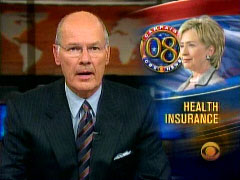 The CBS and ABC evening newscasts led Monday night -- even before O.J. Simpson -- by trumpeting Hillary Clinton's universal health care plan, a proposal fill-in CBS anchor Harry Smith insisted addresses a vital need: "It's a huge problem. An estimated 47 million are not covered." Of course, CBS didn't bother explaining how a significant number of those can afford insurance or are illegal aliens. ABC's medical doctor, Tim Johnson, who back in 1993 called Bill and Hillary Clinton "almost heroes in my mind for finally facing up to the terrible problems we have with our current health care system," praised Senator Clinton's new plan: "Every industrialized country in this world that is successful with health care -- often more successful than we are -- has a partnership between government and the private sector."
The CBS and ABC evening newscasts led Monday night -- even before O.J. Simpson -- by trumpeting Hillary Clinton's universal health care plan, a proposal fill-in CBS anchor Harry Smith insisted addresses a vital need: "It's a huge problem. An estimated 47 million are not covered." Of course, CBS didn't bother explaining how a significant number of those can afford insurance or are illegal aliens. ABC's medical doctor, Tim Johnson, who back in 1993 called Bill and Hillary Clinton "almost heroes in my mind for finally facing up to the terrible problems we have with our current health care system," praised Senator Clinton's new plan: "Every industrialized country in this world that is successful with health care -- often more successful than we are -- has a partnership between government and the private sector."
Smith led the CBS Evening News: "She tried to do it as First Lady. Now, as a presidential candidate, she is trying again. Hillary Clinton today outlined a new plan for making sure every American has health insurance. It's a huge problem. An estimated 47 million are not covered." Reporter Jim Axelrod asserted "Clinton doesn't remind reminding people of her past painful experience in health care reform" because "in the latest CBS News poll, 66 percent of registered voters say her health care experience will help her." Charles Gibson led
ABC's World News: "We start with Senator Clinton, now trying to get to the White House by promising to do something she couldn't do when she was in the White House -- come up with a plan to provide health care for all Americans that would be accepted by Congress."
[This item was posted Monday night on the MRC's blog, NewsBusters.org: newsbusters.org ]
Brian Williams limited coverage to this short item on the NBC Nightly News: "It was the issue that tripped her up as First Lady for a time, but now she is running for President and today Senator Hillary Clinton called for health care coverage for all Americans. This time, the centerpiece of her universal health care plan is that all Americans would be required to have insurance either through their employers or self-purchased with help from the government."
Unlike Williams, the ABC and CBS stories at least offered a brief mention of Clinton's plan to pay for her system by raising taxes on those earning more than $250,000.
In the guise of journalism, the CBS Evening News has been campaigning for universal health care funded by the federal government. An August 9 CyberAlert item, "Universal Health Care Backer's 'Moment of Truth' Championed by CBS," recounted:
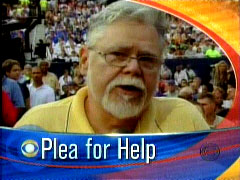 Tremendously exaggerating the number of Americans who lack access to health insurance, CBS on Wednesday night trumpeted the cause of an AFL-CIO member who denounced the United States for not providing health insurance coverage for his wife and endorsed the John Edwards plan for universal health care. Anchor Katie Couric previewed the upcoming story: "Presidential candidates hear a dramatic plea for help from one of the millions of Americans with no health insurance and no way to pay for it." Setting up the tribute to the retiree, Couric asserted that "45 million Americans have no coverage. That includes more than 13 million between the ages of 19 and 29. Many of them don't get coverage from their jobs, and cannot afford to buy it on their own." Of course, many can afford it and in that age range feel comfortable without insurance. In fact, 17 million of the uninsured earn more than $50,000. Removing those, plus people who are not U.S. citizens, leaves fewer than ten million chronically uninsured. Tremendously exaggerating the number of Americans who lack access to health insurance, CBS on Wednesday night trumpeted the cause of an AFL-CIO member who denounced the United States for not providing health insurance coverage for his wife and endorsed the John Edwards plan for universal health care. Anchor Katie Couric previewed the upcoming story: "Presidential candidates hear a dramatic plea for help from one of the millions of Americans with no health insurance and no way to pay for it." Setting up the tribute to the retiree, Couric asserted that "45 million Americans have no coverage. That includes more than 13 million between the ages of 19 and 29. Many of them don't get coverage from their jobs, and cannot afford to buy it on their own." Of course, many can afford it and in that age range feel comfortable without insurance. In fact, 17 million of the uninsured earn more than $50,000. Removing those, plus people who are not U.S. citizens, leaves fewer than ten million chronically uninsured.
Reporter Michelle Miller began her CBS Evening News piece by championing how "every once in a while, a moment of truth breaks through a political campaign event. That happened last night when a 60-year-old retired steel worker from Union Township, Indiana, asked a question." Viewers then saw a clip of Steve Skvara from the AFL-CIO debate shown Tuesday night on MSNBC: "Every day of my life, I sit at the kitchen table across from the woman who devoted 36 years of her life to my family, and I can't afford to pay for her health care. What's wrong with America? And what will you do to change it?" Miller explained that "Skvara says he got the answer he was looking for from his favorite candidate, John Edwards," who proclaimed: "And we ought to have universal health care in this country!" Skvara agreed: "We need a national health care plan." Miller wondered: "Now the question is whether a moment in a debate will be the moment that motivates reform."
For the entire CyberAlert posting: www.mrc.org
An August 2 CyberAlert posting, "CBS Hails 'Landmark' and 'Historic' Federal Control of Health," began:
Wednesday's CBS Evening News trumpeted two liberal efforts to expand government power, leading by heralding "landmark legislation" to have the FDA regulate cigarettes followed by a story slanted in favor of, as reporter Thalia Assuras described it, an "historic expansion of health care coverage for children" of the "working poor." Assuras, however, ignored such inconvenient facts as how a family of four with an income as high as $82,600 could get on the taxpayers' dole....
Couric introduced a look at "getting medical coverage for the millions of American children who don't have it." Assuras touted how a proposed expansion of the State Children's Health Insurance Program (SCHIP) "boosts funding by $50 billion over five years, almost doubling the number of uninsured kids covered from the current six million children to about 11 million." Sinking to the all too common media technique of exploiting a victim to push a liberal policy, Assuras cited "children like seven-year-old Pilar Edwards whose ear ache was so severe her mother brought her to this mobile medical clinic where she could get help even though Pilar is uninsured." Assuras did pass along how critics contend "the legislation is a slippery slope toward a universal health care plan," but against two negative soundbites, viewers heard from four advocates as Assuras concluded with a Senator's charge that "it would be a travesty if the President vetoed this legislation," followed by these final words from Assuras: "With kids caught in the middle." More like taxpayers.
For the rest of the CyberAlert article: www.mrc.org
A 2003 MRC CyberAlert item, "Dr. Tim Johnson Was a Cheerleader for HillaryCare in 1990s," collected some of his quotes from 1993-94:
# "I say the Clintons are almost heroes in my mind for finally facing up to the terrible problems we have with our current health care system and bringing it to the attention of the public....Most people, I think, will be better off." -- ABC Medical Editor Dr. Tim Johnson, September 24, 1993 20/20.
# "Everyone is applauding, I think, in the health care community, the emphasis on universal access, because they know that unless they're going to let some people just die in the streets, it makes sense to get medical care early, when it's going to be more effective and less costly....the insurance companies are the focal point for the dynamics of denial that are part of our present for-profit system." -- ABC medical editor Dr. Tim Johnson, January 26, 1994 World News Tonight.
# "So at least from the physicians represented here, you get a 100 percent vote, including mine, for universal coverage." -- ABC reporter Dr. Tim Johnson to Hillary Clinton on Good Morning America, July 19, 1994.
Those are from the October 21, 2003 CyberAlert: www.mediaresearch.org
Transcripts of the September 17 coverage on CBS and ABC, as provided by the MRC's Brad Wilmouth, who corrected the closed-captioning against the video:
CBS Evening News:
FILL-IN ANCHOR HARRY SMITH LED: She tried to do it as first lady. Now, as a presidential candidate, she is trying again. Hillary Clinton today outlined a new plan for making sure every American has health insurance. It's a huge problem. An estimated 47 million are not covered. In fact, in a CBS News poll out tonight, respondents told us it is the biggest problem facing the country after the war in Iraq and the economy. Tonight, Jim Axelrod on how President Hillary Clinton would solve it.
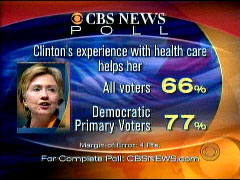 After summarizing the plan, Jim Axelrod segued to critics of it:
After summarizing the plan, Jim Axelrod segued to critics of it:
...Senator Clinton doesn't remind reminding people of her past painful experience in health care reform. That's because, for all the scars that it may have caused, she's benefitting now -- that is, if you believe the polls. In the latest CBS News poll, 66 percent of registered voters say her health care experience will help her. It's even higher with Democratic primary voters...
ABC's World News:
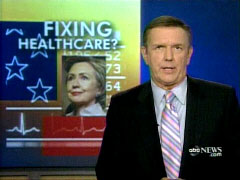 CHARLES GIBSON: We start with Senator Clinton, now trying to get to the White House by promising to do something she couldn't do when she was in the White House -- come up with a plan to provide health care for all Americans that would be accepted by Congress. She says it can be done for $110 billion a year, and she'll pay for it by eliminating some of President Bush's tax cuts. ABC's David Wright joins me tonight from Washington. David?
CHARLES GIBSON: We start with Senator Clinton, now trying to get to the White House by promising to do something she couldn't do when she was in the White House -- come up with a plan to provide health care for all Americans that would be accepted by Congress. She says it can be done for $110 billion a year, and she'll pay for it by eliminating some of President Bush's tax cuts. ABC's David Wright joins me tonight from Washington. David?
Following Wright's look at the plan, a story which ended with Mitt Romney calling it "socialist," Charles Gibson turned to Dr. Tim Johnson:
And our medical editor, Dr. Tim Johnson, joins me now. Tim, David reported on an interesting irony there. They've essentially adapted the plan in Massachusetts initiated by then-Republican Governor Mitt Romney. And yet, Romney says, no, this is socialized medicine. Is that fair?
TIM JOHNSON: I don't think it is fair. They're obviously using that word to scare people, but, in fact, the government programs that Hillary will offer, including Medicare and the federal employees program, have a lot of private choice. Medicare patients can choose any doctor or hospital they want, the federal employees choose from a long list of private plans that the government has vetted for cost and quality. I don't think any Republican would run on a platform saying they want to take Medicare away from seniors or the federal employees plan away from employees, including Congress, just because the government plays an important role.
GIBSON: But, Tim, at the same time, she -- and David played the cut -- she says this is not government-run. And, as you pointed out, to be perfectly frank, it would expand a couple of, major, in major ways, expand a couple of federal programs.
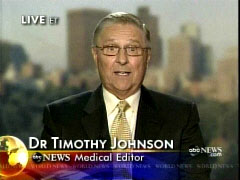 JOHNSON: Well, I think it's fair to say it's not government-run, but certainly the government is involved. And, in fact, every industrialized country in this world that is successful with health care -- often more successful than we are -- has a partnership between government and the private sector. And that's what I think we have to have in this case. As I said, the government has a role in providing guidelines, maybe regulations, but leaving free choice. That's the key, I think, to the partnership. JOHNSON: Well, I think it's fair to say it's not government-run, but certainly the government is involved. And, in fact, every industrialized country in this world that is successful with health care -- often more successful than we are -- has a partnership between government and the private sector. And that's what I think we have to have in this case. As I said, the government has a role in providing guidelines, maybe regulations, but leaving free choice. That's the key, I think, to the partnership.
GIBSON: In just in about ten seconds, is she inevitably tainted by the fact that she tried to work on this issue in 1993 and failed?
JOHNSON: I don't think inevitably. She's obviously being much more open about the process now than she was back then. I think that will pay off.
  Matthews: 'Should We Put Exxon Signs Matthews: 'Should We Put Exxon Signs
Up Over Arlington Cemetery?'
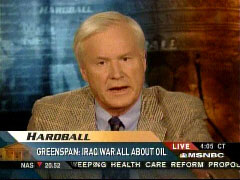 Chris Matthews might as well have chanted "No Blood For Oil" throughout the Monday edition of MSNBC's Hardball as he sounded like an anti-war protestor when he charged that U.S. servicemen and women were spilling blood for Big Oil: "Are we fighting for the American oil companies for Mobil and Exxon? And they are making these enormous profits because of access to oil over there....Should we put Exxon signs up over Arlington Cemetery and Mobil signs up there, like they have at baseball stadiums?"
Chris Matthews might as well have chanted "No Blood For Oil" throughout the Monday edition of MSNBC's Hardball as he sounded like an anti-war protestor when he charged that U.S. servicemen and women were spilling blood for Big Oil: "Are we fighting for the American oil companies for Mobil and Exxon? And they are making these enormous profits because of access to oil over there....Should we put Exxon signs up over Arlington Cemetery and Mobil signs up there, like they have at baseball stadiums?"
Pivoting off a David Shuster report that claimed Alan Greenspan "provided evidence" that the Iraq war has been "fought for oil," Matthews devoted much of the September 17 edition of Hardball to that conspiracy theory.
[This item, by Geoffrey Dickens, was posted Monday evening on the MRC's blog, NewsBusters.org: newsbusters.org ]
In citing Greenspan's quote in his book that "the Iraq war is largely about oil," Shuster and Matthews presumed Greenspan was endorsing the left-wing conspiracies claiming the war was launched to enrich oil companies, Bush, Cheney and their friends even though Greenspan, as he explained on Monday's Today show, called that assumption "utterly unfair." He does not think the Bush administration went to war for oil and he only meant that "Saddam Hussein was obviously seeking to get a chokehold on the Straits of Hormuz, where about 18 million barrels a day flow from the Middle East to the industrial world" and thus an uninhibited Hussein could threaten Western economies. (For more, see item #3 below)
Below are Shuster's report followed by Matthews' various "No Blood for Oil," rants:
DAVID SHUSTER: No blood for oil has long been a rallying cry for activists against the Iraq war and as the marchers demonstrated again this weekend a top Washington insider, former Fed chairman Alan Greenspan provided evidence that bolstered the controversial argument the Iraq war was launched and continues to be fought for oil. In his book, The Age of Turbulence: Adventures In A New World, Greenspan writes, quote, "I am saddened that it is politically inconvenient to acknowledge what everyone knows, the Iraq war is largely about oil." It's a huge problem for the Bush administration when there's any evidence to suggest 3800 American soldiers have died to keep oil prices down. Former Fed chair Alan Greenspan is one of the most respected and influential voices in the country. So administration officials are speaking about the Iraq war and are trying to re-frame the issue.
DEFENSE SECRETARY ROBERT GATES: I think that it's really about stability in the Gulf.
SHUSTER: On the Today show, this morning, Greenspan tried to help the administration by offering a clarification. But it only seemed to reinforce his original point.
ALAN GREENSPAN: I'm not saying that they believed it was about oil, I'm saying it is about oil and that I believe it was necessary to get Saddam out of there.
SHUSTER: Greenspan then spoke about a crucial transit point for oil in the Persian Gulf and fears of economic chaos.
GREENSPAN: Saddam Hussein was obviously seeking to get a choke-hold on the Straits of Hormuz where about 18 million barrels a day flow from the Middle East to the industrial world.
SHUSTER: That more nuanced argument from Greenspan, today, is similar to what was said 16 years ago when Iraq invaded Kuwait and paused within striking distance of Saudi Arabia. Bush 41 and his top cabinet officials said America needed to push Iraqi forces back and protect regional oil supplies for the sake of America's economic stability. But four-and-a-half years ago on the eve of the second Gulf war, officials working for the second Bush administration, seemed to go much further by talking not just about stability but about economic gains. President Bush's own economic adviser, Larry Lindsey told the Washington Times that invading Iraq and gaining access to Iraqi oil would be a huge boost. Quote, "Under every plausible scenario, the negative effect will be quite small relative to the economic benefits that would come from a successful prosecution of the war. They key issue is oil, and a regime change in Iraq would facilitate an increase in world oil."
Then Undersecretary of Defense Paul Wolfowitz offered similar testimony to Congress. Quote, "It's got already, I believe, on the order of $15 billion to $20 billion a year in oil exports, which can finally, might finally be turned to a good use instead of a building Saddam's palaces." And Wolfowitz told lawmakers that Iraqi oil would not only be accessible to West but could be used to pay for whatever rebuilding in Iraq might be necessary. Quote, "We are dealing with a country that can really finance its own reconstruction and relatively soon." When the war began American special operations forces raced ahead to secure Iraq's oil fields. Then, after Baghdad fell, American troops guarded America's oil ministry, the one ministry that was protected from looters. For the last four-and-a-half years the Bush administration has insisted the war was not being fought to gain access to Iraqi oil, but keeping oil supplies and transit point safe continues to be a White House talking point. Last week President Bush listed several potential problems if U.S. troops withdrew, including.
GEORGE W. BUSH: Extremists could control a key part of the global energy supply.
SHUSTER: So it is blood for oil, at least in part. The argument is whether it's about strictly protecting economic stability as Alan Greenspan now suggests, or whether it's something far more nefarious as White House critics increasingly believe. I'm David Shuster for Hardball in Washington.
...
MATTHEWS: Are we fighting for the American oil companies for Mobil and Exxon? And they are making these enormous profits because of access to oil over there. Jim [Cramer] are we over there getting killed and maimed so that these guys can make the $32 billion in profits in the first quarter? I mean look at the money they made in the first quarter this year.
...
MATTHEWS: So if you're in the European left and never liked Bush, to start with, now you got his Fed chairman say it's all about oil, you love it, right? This is the old Marxist analysis.
HOWARD FINEMAN, NEWSWEEK: Well it is but I, I think, to some extent it's unarguably true. And there are various times, as David Shuster said earlier in the show, we reported earlier in the show when these arguments were being made by administration officials it wasn't the number one reason. Number one was mushroom cloud. Number two was Saddam and Osama Bin Laden, etc, etc.
...
JILL ZUCKMAN, Chicago Tribune: I think this is one of the reasons why what Greenspan says has so much resonance because this is the Texas oil crowd in the White House and so-
MATTHEWS: The oil patch crowd.
ZUCKMAN: -people assume that a lot of what they do is motivated.
MATTHEWS: Okay let me ask you this. Exxon, Mobil, making tens of billions of dollars in profits this year. So the war worked out well for them right?
ZUCKMAN: Yes and we can pay crazy amounts of money at the pump.
MATTHEWS: Should we put Exxon signs up over Arlington Cemetery and Mobil signs up there, like they have at baseball stadiums?
  ABC Touts Greenspan's Bush Went to War ABC Touts Greenspan's Bush Went to War
for Oil, Skips Real View
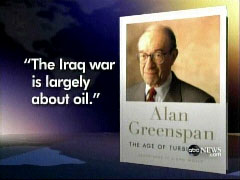 "Harsh accusation," ABC anchor Dan Harris teased at the top of Sunday's World News as he highlighted how "one of the most respected figures in Washington says the Bush administration went to war in Iraq because of oil." Harris soon referred to it as "an eyebrow raising allegation on Iraq" in a new book from Alan Greenspan, the former Chairman of the Federal Reserve. But after a Monday Washington Post story, in which Greenspan declared that oil was "not the administration's motive," and appearance by on the Today show made it abundantly clear the inaccuracy of the implication that Greenspan was somehow endorsing a left-wing conspiracy theory about how George W. Bush went to war to financially benefit Dick Cheney's oil industry friends,
"Harsh accusation," ABC anchor Dan Harris teased at the top of Sunday's World News as he highlighted how "one of the most respected figures in Washington says the Bush administration went to war in Iraq because of oil." Harris soon referred to it as "an eyebrow raising allegation on Iraq" in a new book from Alan Greenspan, the former Chairman of the Federal Reserve. But after a Monday Washington Post story, in which Greenspan declared that oil was "not the administration's motive," and appearance by on the Today show made it abundantly clear the inaccuracy of the implication that Greenspan was somehow endorsing a left-wing conspiracy theory about how George W. Bush went to war to financially benefit Dick Cheney's oil industry friends,
ABC's World News on Monday failed to offer any correction for its incendiary, and erroneous, reporting. In fact, the September 17 World News didn't mention Greenspan at all.
[This item was posted early Tuesday morning on the MRC's blog, NewsBusters.org: newsbusters.org ]
In a Monday Washington Post story, "Greenspan: Ouster of Hussein Crucial for Oil Security," Bob Woodward explained:
"He made the striking comment in a new memoir out today that 'the Iraq War is largely about oil.' In the interview, he clarified that sentence in his 531-page book, saying that while securing global oil supplies was 'not the administration's motive,' he had presented the White House with the case for why removing Hussein was important for the global economy. 'I was not saying that that's the administration's motive,' Greenspan said in an interview Saturday, 'I'm just saying that if somebody asked me, "Are we fortunate in taking out Saddam?" I would say it was essential.'"
For the September 17 Washington Post article: www.washingtonpost.com
On Monday's Today show to plug his new book, The Age of Turbulence: Adventures in a New World, Greenspan directly contradicted what ABC presumed Sunday night. Matt Lauer pointed out: "Liberal bloggers are having a field day with this. They're saying here's a Republican saying the administration lied about the reason to go to war. Is that a spin? Is that fair?" Greenspan retorted: "It's utterly unfair."
The MRC's Geoffrey Dickens took down this exchange between Lauer and Greenspan on the September 17 Today on NBC:
MATT LAUER: You write a 500 page book and you know what happens, people want to talk about a certain couple of key sentences in that book. So let's get to a couple of them right now. In a chapter about the long-term energy squeeze you write, quote, 'I am saddened that it is politically inconvenient to acknowledge what everyone knows: the Iraq war is largely about oil.' Now as a lifelong libertarian Republican, as the former Chairman of the Federal Reserve, you know that when you speak, people are gonna listen, they're gonna react. Liberal bloggers are having a field day with this. They're saying here's a Republican saying the administration lied about the reason to go to war. Is that a spin? Is that fair?
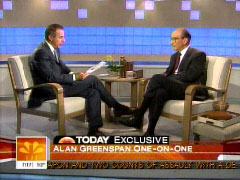 GREENSPAN: It's utterly unfair. I was expressing my view. Saddam Hussein was obviously seeking to get a chokehold on the Straits of Hormuz, where about 18 million barrels a day, flow from the Middle East to the industrial world. Had he been able to get a hold of a nuclear weapon and indeed move through Kuwait and into Saudi Arabia and control the Straits of Hormuz it would have caused chaos in the international- GREENSPAN: It's utterly unfair. I was expressing my view. Saddam Hussein was obviously seeking to get a chokehold on the Straits of Hormuz, where about 18 million barrels a day, flow from the Middle East to the industrial world. Had he been able to get a hold of a nuclear weapon and indeed move through Kuwait and into Saudi Arabia and control the Straits of Hormuz it would have caused chaos in the international-
LAUER: So are we talking about semantics here, Alan? In other words the, the administration went to the war saying it was all about weapons of mass destruction-
GREENSPAN: I believe, I think, I believe that they believed that. I'm not saying that they believed it was about oil. I'm saying it is about oil and that I believe it was necessary to get Saddam out of there.
LAUER: Maybe, maybe the better way to put it, it was about stability. It was about stability in a region and whether it was about weapons of mass destruction destabilizing that region or oil, it's all about stability.
GREENSPAN: Absolutely.
Dan Harris set up the September 16 World News story on ABC:
"The White House is pushing back tonight against an eyebrow raising allegation on Iraq. One of the best known and most highly regarded people in Washington, the former Federal Reserve Board Chairman Alan Greenspan, says the Bush administration went to war in Iraq largely because of oil. That is just one of the criticisms Greenspan is leveling in a new book that's coming out tomorrow. Here's ABC's John Cochran."
Cochran ran through several of the points made by Greenspan, particularly his disappointment with soaring spending during the Bush years, before getting to the oil charge:
COCHRAN: Greenspan especially upset the White House by writing in his book that "The Iraq war is largely about oil." Today on ABC's This Week, Defense Secretary Gates said Greenspan is wrong.
ROBERT GATES: I know the same allegation was made about the gulf war in 1991, and i just don't believe it's true.
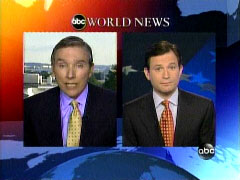 COCHRAN: Dan, when I asked a White House spokesman about Greenspan's charge he dismissed it with what seemed like bitterness, saying quote: "I will restrain myself. The reasons we went to Iraq are well understood and had to do with weapons of mass destruction." As for Greenspan's opinion the spokesman said "that sounds like Georgetown cocktail party analysis." COCHRAN: Dan, when I asked a White House spokesman about Greenspan's charge he dismissed it with what seemed like bitterness, saying quote: "I will restrain myself. The reasons we went to Iraq are well understood and had to do with weapons of mass destruction." As for Greenspan's opinion the spokesman said "that sounds like Georgetown cocktail party analysis."
HARRIS: Sensitive topic, no question about it. John thank you.
But not sensitive enough for ABC to correct the next night.
  Begala Sees Bush 'Betrayal,' Michael Begala Sees Bush 'Betrayal,' Michael
Moore and MoveOn as Centrist
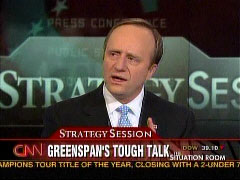 On Monday's The Situation Room hosted by Wolf Blitzer, CNN's liberal political analyst/former Clinton advisor Paula Begala distorted Alan Greenspan's words about the Iraq war being about oil, and accused President Bush of the "most damning indictment and betrayal that Mr. Bush could have committed." Begala also commented that Greenspan's words show that Michael Moore and MoveOn.org "were in the center" on the issue of Iraq: "Alan Greenspan ain't the kook left. He ain't Michael Moore. He ain't MoveOn. In fact, he is a guy who now shows that Michael Moore, MoveOn, and the rest of them were in the center."
On Monday's The Situation Room hosted by Wolf Blitzer, CNN's liberal political analyst/former Clinton advisor Paula Begala distorted Alan Greenspan's words about the Iraq war being about oil, and accused President Bush of the "most damning indictment and betrayal that Mr. Bush could have committed." Begala also commented that Greenspan's words show that Michael Moore and MoveOn.org "were in the center" on the issue of Iraq: "Alan Greenspan ain't the kook left. He ain't Michael Moore. He ain't MoveOn. In fact, he is a guy who now shows that Michael Moore, MoveOn, and the rest of them were in the center."
Greenspan's book, The Age of Turbulence can be found at: www.amazon.com
[This item, by Brad Wilmouth, was posted late Monday night on the MRC's blog, NewsBusters.org: newsbusters.org ]
Near the end of the 4pm EDT hour of the September 17 Situation Room, during a discussion with Begala and former Republican Congressman J.C. Watts, Blitzer brought up Greenspan's words from the former Federal Reserve Chairman's new book: "Another controversial thing he writes in the book involves the war in Iraq. Listen to this, J.C. He says, Greenspan: 'I am saddened that it is politically inconvenient to acknowledge what everyone knows: the Iraq war is largely about oil.'"
After Watts responded, Blitzer turned to Begala: "If the President was hoping the price of oil would go down as the result of the liberation of Iraq, he obviously is wrong. It's now approaching $80 a barrel, twice what it was when the U.S. went into Iraq."
After seeming to give some acknowledgement of Michael Moore and MoveOn.org being in the "kook left," Begala argued that Greenspan's contention that the Iraq war is about oil proves that Moore and MoveOn.org "were in the center." Referring to his time co-hosting CNN's Crossfire, Begala contended: "I never once said that the Iraq war was about oil. I couldn't bring myself to imagine that or believe that. In fact, many times, I dismissed that view, saying, well, that's the kook left, not people like me who were closer to the center. Well, Alan Greenspan ain't the kook left. He ain't Michael Moore. He ain't MoveOn. In fact, he is a guy who now shows that Michael Moore, MoveOn, and the rest of them were in the center. By the way, MoveOn.org never said this was a war about oil, either."
Begala went on to accuse the President of "the most damning indictment and betrayal that Mr. Bush could have committed," charging: "Alan Greenspan has known Dick Cheney and Donald Rumsfeld probably longer and better than almost anybody. And, as you point out, with remarkable clarity, those seven words, he says the Iraq war was largely about oil. This is the most damning indictment and betrayal that Mr. Bush could have committed."
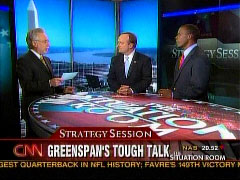 Watts and Blitzer then alluded to Greenspan's comments on Monday's Today show to clarify his meaning in which the former Federal Reserve Chairman denied believing that President Bush chose to invade Iraq because of oil:
Watts and Blitzer then alluded to Greenspan's comments on Monday's Today show to clarify his meaning in which the former Federal Reserve Chairman denied believing that President Bush chose to invade Iraq because of oil:
WATTS: Well, but the Chairman, you know, he's a bit confusing because, again, today...I read-
BLITZER: He's clarifying his remarks on the Today show this morning, and he's since suggesting it wasn't as blunt as the words he wrote in his book.
WATTS: Exactly, and usually, as Chairman Barney Frank said, when people say, well, they misinterpreted what I said, they're usually meaning, "I wish I wouldn't have said that" because it wasn't a war about oil, but to say that oil didn't factor into it in terms of the world economy, the global economy, is just nonsense.
See item #3 above for details of Alan Greenspan's explanation in Monday's Washington Post and on Monday's Today show.
  Media Sanitize Extreme Views from Anti-War Media Sanitize Extreme Views from Anti-War
Protest Coverage
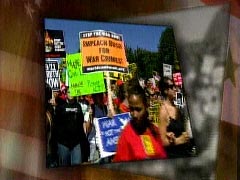 The mainstream media's coverage of the antiwar march in Washington, DC did its best to ignore the extreme Left views that were on display at the protest. A split-second image at the very beginning of Saturday evening's NBC Nightly News showed some of the extreme views that were on display on signs, which included a call for the impeachment of President Bush for "war crimes," and a sign that cried "9/11 Truth Now!" The full NBC Nightly News report on the march devoted almost a minute to footage of the antiwar marchers, and only 15 seconds to comments from one of the pro-Iraq war counter-protesters who lined the march route. Anyone who tuned in would have to look carefully for any sign of radical views. (College football bumped the ABC and CBS evening newscasts on Saturday night.)
The mainstream media's coverage of the antiwar march in Washington, DC did its best to ignore the extreme Left views that were on display at the protest. A split-second image at the very beginning of Saturday evening's NBC Nightly News showed some of the extreme views that were on display on signs, which included a call for the impeachment of President Bush for "war crimes," and a sign that cried "9/11 Truth Now!" The full NBC Nightly News report on the march devoted almost a minute to footage of the antiwar marchers, and only 15 seconds to comments from one of the pro-Iraq war counter-protesters who lined the march route. Anyone who tuned in would have to look carefully for any sign of radical views. (College football bumped the ABC and CBS evening newscasts on Saturday night.)
Both the New York Times and the Washington Post covered the march in their Sunday editions. However, they ignored some of the radical statements that were made from the stage at the antiwar rally before the march. The photos that accompanied both the print edition and online versions of the articles also glossed over the extreme views that were expressed on signs and banners at the march.
New York Times story: www.nytimes.com
Washington Post article: www.washingtonpost.com
[This item, by Matthew Balan, was posted Monday on the MRC's blog, NewsBusters.org: newsbusters.org ]
In a report from Michael Lipin of the Voice of America, former attorney general Ramsey Clark, who was pro-Saddam enough to serve as his defense lawyer in Baghdad, was quoted as saying, "Nothing is going to stop this machine except the impeachment of George Bush and his gang... when you remove him for high crimes, then you know the next president will pay attention." Neither the Times nor the Post mentioned Clark's work for Saddam in their articles. The VOA story: www.voanews.com
Cindy Sheehan, who had "retired" from the antiwar movement a few months earlier, also addressed the crowd. "If we don't want to become like Nazi Germany, and you know, these people want us to become like Nazi Germany, it's time for us to stand up and lay down, and it's time for us to do civil disobedience on a massive scale."
The national edition of the Sunday New York Times only included one photograph of a antiwar protester being arrested by the U.S. Capitol Police with its article. The Sunday Washington Post had several photographs of both pro and anti-Iraq war protesters. But both papers chose to ignore extreme viewpoints, such as "9/11 Was An Inside Job," that were expressed at the anti-war march. FreeRepublic posted a photo: www.freerepublic.com
Washington Post columnist Marc Fisher began a commentary on the competing protests by making an odd statement. "I hope you enjoy today's biased coverage of this weekend's Iraq war demonstrations." If you thought that was an admission of bias on the part of the Washington Post, think again. Fisher was actually lamenting the fact that all the media attention is on the outdoor demonstrations, and not on the raging war-of-words over the Iraq war that is being waged online. Fisher's September 16 column: www.washingtonpost.com
  GMA's Weatherman Touts Emotional Benefits GMA's Weatherman Touts Emotional Benefits
of Carbon Credits
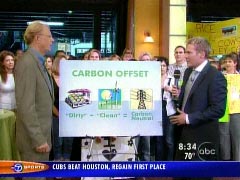 On Friday's Good Morning America, liberal weatherman Sam Champion featured actor/activist Ed Begley Jr. to promote the concept of carbon offsets. The ABC meteorologist gushed over the emotional benefits of this environmental program. He exclaimed: "And you, kind of, pay into them and they fund projects that are doing good work. So you feel better about your energy use by helping create greener energy, basically."
On Friday's Good Morning America, liberal weatherman Sam Champion featured actor/activist Ed Begley Jr. to promote the concept of carbon offsets. The ABC meteorologist gushed over the emotional benefits of this environmental program. He exclaimed: "And you, kind of, pay into them and they fund projects that are doing good work. So you feel better about your energy use by helping create greener energy, basically."
The segment featured no skepticism as to the validity of these offsets. Rather, the tone was set by Champion's introduction. He lectured: "We just can't help it. But every time we flip on a light switch, we're making pollution..." Later, Begley excitedly asserted that if enough people purchase carbon offsets, "...Guess what? They're going to shut down power plants."
Carbon offsets work under the dubious notion of paying money towards environmental projects in order to make up for the carbon dioxide that one produces. But neither Begley, nor Champion bothered going into very much detail about how the concept works. Instead, the actor enthused about obscure environmental companies such as "Green Switch" and "TerraPass." See: www.terrapass.com
GMA's meteorologist has a long history of mixing left-wing environmental politics with the day's forecast. In January, a segment he hosted wondered if "billions" will die from global warming. In April, he lectured viewers about the need to have "green" weddings. See the February 1 CyberAlert: www.mrc.org
And NewsBusters from April: newsbusters.org
[This item, by Scott Whitlock, was posted Monday afternoon on the MRC's blog, NewsBusters.org: newsbusters.org ]
A transcript of the September 14 segment, which aired at 8:32am:
Sam Champion: "We've got our 'just one thing" with Ed Begley Jr. this morning as our guest. But now, We just can't help it. We just can't help it. But every time we flip on a light switch, we're making pollution or you turn on a TV, because all of that electricity comes from, basically, from electricity plants that are fueled by coal burning. Right?"
Ed Begley Jr., Living with Ed reality show on the Home & Garden channel: "Coal is a natural gas, but there's a lot of coal burned in this country to make kilowatts."
Champion: "Let me first say, 'Living with Ed,' your show."
Begley: "Thank you."
Champion: "And also we know you are a green activist. And so, you're going to tell us how we can make a difference if we maybe we do something you're calling carbon offsets. So, explain that for me."
Begley: "What it is that, every American makes about 22 tons of C02 every year. And how could you mitigate that? With a carbon offset. It's a good way to reduce that amount of C02. First thing you do, is you reduce your power usage in your home. Compact fluorescent bulb. Energy saving thermostat. Good insulation. Or you got these power strips that will turn off a whole bunch of-"
Champion: "We love all those ideas."
Begley: "There's a company called Green Switch too that will turn 'em all when you leave your house. A very good way to go with that. Then you figure out what number is, what you're using after you do all these reductions and then you find a way through TerraPass or Native Energies to reduce that number, to offset it by buying green energy out in the marketplace."
Champion: "All right. Now, the reason and you've listed one or two, [To child in the audience] excuse me darling. You've listed one or two things to tell us about offsetting. Now, how do we know this works? What's the theory here?"
Begley: "There's independent groups that verify. Groups like TerraPass and Native Energy, the ones that do it. You can go to ABC.com. You can go to the EPA website to verify this stuff. But a carbon offset takes the dirty fuel, you've done your reductions at home through Green Switch, through these different things to reduce your power usage. Then you go to Native Energy. You go to TerraPass. And you become carbon neutral."
Champion: "And you kind of pay into them and they fund projects that are doing good work. So you feel better about your energy use by helping create greener energy, basically."
Begley: "And you're not eliminating the power plant usage. That's out there."
Champion: "Right."
Begley: "But you're feeding green kilowatts into the system. And if enough people do that, guess what? They're going to shut down power plants."
Champion: "And, Ed, they can check your website and ABC News.com."
Begley: "Or Living With Ed, LivingwithEd.net."
Champion: "Just to make sure that it's a good organization your doing this with, if your so inclined to do the carbon offset. Ed Begley Jr., thank you so much for helping us out with the whole idea."
Begley: "Yep. Thank you so much."
Champion: "It makes sense when it comes from you."
  'Top Ten Surprises in General Petraeus's 'Top Ten Surprises in General Petraeus's
Report to Congress'
From the Late Show Newsletter for the week of September 17, "an exclusive un-aired Top Ten list edited from the 9/11/07 broadcast," the "Top Ten Surprises in General Petraeus's Report to Congress." Late Show home page: www.cbs.com
10. Opens with a forward from Jerry Stiller
9. Kurds and Sunnis are contemplating joining forces under the new name, "Kurnis"
8. Accused Iran of destabilizing Britney Spears
7. Trying to smooth tensions between Kid Rock and Tommy Lee
6. Addressed some congressman as "Mommy"
5. An entire section devoted to his famous ham salad recipe
4. No number 4 -- writer still stuck on grounded JetBlue flight -- man, what's it been like 2 months?
3. Most of his solutions were based on old episodes of "MacGyver"
2. Said more needs to be done about senators with wide restroom stances
1. Will also look into why the hell honeymooners would come to the Late Show
I can understand why the list was cut from the show.
-- Brent Baker

Home | News Division
| Bozell Columns | CyberAlerts
Media Reality Check | Notable Quotables | Contact
the MRC | Subscribe
|
























 The CBS and ABC evening newscasts led Monday night -- even before O.J. Simpson -- by trumpeting Hillary Clinton's universal health care plan, a proposal fill-in CBS anchor Harry Smith insisted addresses a vital need: "It's a huge problem. An estimated 47 million are not covered." Of course, CBS didn't bother explaining how a significant number of those can afford insurance or are illegal aliens. ABC's medical doctor, Tim Johnson, who back in 1993 called Bill and Hillary Clinton "almost heroes in my mind for finally facing up to the terrible problems we have with our current health care system," praised Senator Clinton's new plan: "Every industrialized country in this world that is successful with health care -- often more successful than we are -- has a partnership between government and the private sector."
The CBS and ABC evening newscasts led Monday night -- even before O.J. Simpson -- by trumpeting Hillary Clinton's universal health care plan, a proposal fill-in CBS anchor Harry Smith insisted addresses a vital need: "It's a huge problem. An estimated 47 million are not covered." Of course, CBS didn't bother explaining how a significant number of those can afford insurance or are illegal aliens. ABC's medical doctor, Tim Johnson, who back in 1993 called Bill and Hillary Clinton "almost heroes in my mind for finally facing up to the terrible problems we have with our current health care system," praised Senator Clinton's new plan: "Every industrialized country in this world that is successful with health care -- often more successful than we are -- has a partnership between government and the private sector."  Tremendously exaggerating the number of Americans who lack access to health insurance, CBS on Wednesday night trumpeted the cause of an AFL-CIO member who denounced the United States for not providing health insurance coverage for his wife and endorsed the John Edwards plan for universal health care. Anchor Katie Couric previewed the upcoming story: "Presidential candidates hear a dramatic plea for help from one of the millions of Americans with no health insurance and no way to pay for it." Setting up the tribute to the retiree, Couric asserted that "45 million Americans have no coverage. That includes more than 13 million between the ages of 19 and 29. Many of them don't get coverage from their jobs, and cannot afford to buy it on their own." Of course, many can afford it and in that age range feel comfortable without insurance. In fact, 17 million of the uninsured earn more than $50,000. Removing those, plus people who are not U.S. citizens, leaves fewer than ten million chronically uninsured.
Tremendously exaggerating the number of Americans who lack access to health insurance, CBS on Wednesday night trumpeted the cause of an AFL-CIO member who denounced the United States for not providing health insurance coverage for his wife and endorsed the John Edwards plan for universal health care. Anchor Katie Couric previewed the upcoming story: "Presidential candidates hear a dramatic plea for help from one of the millions of Americans with no health insurance and no way to pay for it." Setting up the tribute to the retiree, Couric asserted that "45 million Americans have no coverage. That includes more than 13 million between the ages of 19 and 29. Many of them don't get coverage from their jobs, and cannot afford to buy it on their own." Of course, many can afford it and in that age range feel comfortable without insurance. In fact, 17 million of the uninsured earn more than $50,000. Removing those, plus people who are not U.S. citizens, leaves fewer than ten million chronically uninsured.  After summarizing the plan, Jim Axelrod segued to critics of it:
After summarizing the plan, Jim Axelrod segued to critics of it:  CHARLES GIBSON: We start with Senator Clinton, now trying to get to the White House by promising to do something she couldn't do when she was in the White House -- come up with a plan to provide health care for all Americans that would be accepted by Congress. She says it can be done for $110 billion a year, and she'll pay for it by eliminating some of President Bush's tax cuts. ABC's David Wright joins me tonight from Washington. David?
CHARLES GIBSON: We start with Senator Clinton, now trying to get to the White House by promising to do something she couldn't do when she was in the White House -- come up with a plan to provide health care for all Americans that would be accepted by Congress. She says it can be done for $110 billion a year, and she'll pay for it by eliminating some of President Bush's tax cuts. ABC's David Wright joins me tonight from Washington. David?  JOHNSON: Well, I think it's fair to say it's not government-run, but certainly the government is involved. And, in fact, every industrialized country in this world that is successful with health care -- often more successful than we are -- has a partnership between government and the private sector. And that's what I think we have to have in this case. As I said, the government has a role in providing guidelines, maybe regulations, but leaving free choice. That's the key, I think, to the partnership.
JOHNSON: Well, I think it's fair to say it's not government-run, but certainly the government is involved. And, in fact, every industrialized country in this world that is successful with health care -- often more successful than we are -- has a partnership between government and the private sector. And that's what I think we have to have in this case. As I said, the government has a role in providing guidelines, maybe regulations, but leaving free choice. That's the key, I think, to the partnership. 
 Chris Matthews might as well have chanted "No Blood For Oil" throughout the Monday edition of MSNBC's Hardball as he sounded like an anti-war protestor when he charged that U.S. servicemen and women were spilling blood for Big Oil: "Are we fighting for the American oil companies for Mobil and Exxon? And they are making these enormous profits because of access to oil over there....Should we put Exxon signs up over Arlington Cemetery and Mobil signs up there, like they have at baseball stadiums?"
Chris Matthews might as well have chanted "No Blood For Oil" throughout the Monday edition of MSNBC's Hardball as he sounded like an anti-war protestor when he charged that U.S. servicemen and women were spilling blood for Big Oil: "Are we fighting for the American oil companies for Mobil and Exxon? And they are making these enormous profits because of access to oil over there....Should we put Exxon signs up over Arlington Cemetery and Mobil signs up there, like they have at baseball stadiums?" 
 "Harsh accusation," ABC anchor Dan Harris teased at the top of Sunday's World News as he highlighted how "one of the most respected figures in Washington says the Bush administration went to war in Iraq because of oil." Harris soon referred to it as "an eyebrow raising allegation on Iraq" in a new book from Alan Greenspan, the former Chairman of the Federal Reserve. But after a Monday Washington Post story, in which Greenspan declared that oil was "not the administration's motive," and appearance by on the Today show made it abundantly clear the inaccuracy of the implication that Greenspan was somehow endorsing a left-wing conspiracy theory about how George W. Bush went to war to financially benefit Dick Cheney's oil industry friends,
"Harsh accusation," ABC anchor Dan Harris teased at the top of Sunday's World News as he highlighted how "one of the most respected figures in Washington says the Bush administration went to war in Iraq because of oil." Harris soon referred to it as "an eyebrow raising allegation on Iraq" in a new book from Alan Greenspan, the former Chairman of the Federal Reserve. But after a Monday Washington Post story, in which Greenspan declared that oil was "not the administration's motive," and appearance by on the Today show made it abundantly clear the inaccuracy of the implication that Greenspan was somehow endorsing a left-wing conspiracy theory about how George W. Bush went to war to financially benefit Dick Cheney's oil industry friends,  GREENSPAN: It's utterly unfair. I was expressing my view. Saddam Hussein was obviously seeking to get a chokehold on the Straits of Hormuz, where about 18 million barrels a day, flow from the Middle East to the industrial world. Had he been able to get a hold of a nuclear weapon and indeed move through Kuwait and into Saudi Arabia and control the Straits of Hormuz it would have caused chaos in the international-
GREENSPAN: It's utterly unfair. I was expressing my view. Saddam Hussein was obviously seeking to get a chokehold on the Straits of Hormuz, where about 18 million barrels a day, flow from the Middle East to the industrial world. Had he been able to get a hold of a nuclear weapon and indeed move through Kuwait and into Saudi Arabia and control the Straits of Hormuz it would have caused chaos in the international-  COCHRAN: Dan, when I asked a White House spokesman about Greenspan's charge he dismissed it with what seemed like bitterness, saying quote: "I will restrain myself. The reasons we went to Iraq are well understood and had to do with weapons of mass destruction." As for Greenspan's opinion the spokesman said "that sounds like Georgetown cocktail party analysis."
COCHRAN: Dan, when I asked a White House spokesman about Greenspan's charge he dismissed it with what seemed like bitterness, saying quote: "I will restrain myself. The reasons we went to Iraq are well understood and had to do with weapons of mass destruction." As for Greenspan's opinion the spokesman said "that sounds like Georgetown cocktail party analysis." 
 On Monday's The Situation Room hosted by Wolf Blitzer, CNN's liberal political analyst/former Clinton advisor Paula Begala distorted Alan Greenspan's words about the Iraq war being about oil, and accused President Bush of the "most damning indictment and betrayal that Mr. Bush could have committed." Begala also commented that Greenspan's words show that Michael Moore and MoveOn.org "were in the center" on the issue of Iraq: "Alan Greenspan ain't the kook left. He ain't Michael Moore. He ain't MoveOn. In fact, he is a guy who now shows that Michael Moore, MoveOn, and the rest of them were in the center."
On Monday's The Situation Room hosted by Wolf Blitzer, CNN's liberal political analyst/former Clinton advisor Paula Begala distorted Alan Greenspan's words about the Iraq war being about oil, and accused President Bush of the "most damning indictment and betrayal that Mr. Bush could have committed." Begala also commented that Greenspan's words show that Michael Moore and MoveOn.org "were in the center" on the issue of Iraq: "Alan Greenspan ain't the kook left. He ain't Michael Moore. He ain't MoveOn. In fact, he is a guy who now shows that Michael Moore, MoveOn, and the rest of them were in the center."  Watts and Blitzer then alluded to Greenspan's comments on Monday's Today show to clarify his meaning in which the former Federal Reserve Chairman denied believing that President Bush chose to invade Iraq because of oil:
Watts and Blitzer then alluded to Greenspan's comments on Monday's Today show to clarify his meaning in which the former Federal Reserve Chairman denied believing that President Bush chose to invade Iraq because of oil: 
 The mainstream media's coverage of the antiwar march in Washington, DC did its best to ignore the extreme Left views that were on display at the protest. A split-second image at the very beginning of Saturday evening's NBC Nightly News showed some of the extreme views that were on display on signs, which included a call for the impeachment of President Bush for "war crimes," and a sign that cried "9/11 Truth Now!" The full NBC Nightly News report on the march devoted almost a minute to footage of the antiwar marchers, and only 15 seconds to comments from one of the pro-Iraq war counter-protesters who lined the march route. Anyone who tuned in would have to look carefully for any sign of radical views. (College football bumped the ABC and CBS evening newscasts on Saturday night.)
The mainstream media's coverage of the antiwar march in Washington, DC did its best to ignore the extreme Left views that were on display at the protest. A split-second image at the very beginning of Saturday evening's NBC Nightly News showed some of the extreme views that were on display on signs, which included a call for the impeachment of President Bush for "war crimes," and a sign that cried "9/11 Truth Now!" The full NBC Nightly News report on the march devoted almost a minute to footage of the antiwar marchers, and only 15 seconds to comments from one of the pro-Iraq war counter-protesters who lined the march route. Anyone who tuned in would have to look carefully for any sign of radical views. (College football bumped the ABC and CBS evening newscasts on Saturday night.) 
 On Friday's Good Morning America, liberal weatherman Sam Champion featured actor/activist Ed Begley Jr. to promote the concept of carbon offsets. The ABC meteorologist gushed over the emotional benefits of this environmental program. He exclaimed: "And you, kind of, pay into them and they fund projects that are doing good work. So you feel better about your energy use by helping create greener energy, basically."
On Friday's Good Morning America, liberal weatherman Sam Champion featured actor/activist Ed Begley Jr. to promote the concept of carbon offsets. The ABC meteorologist gushed over the emotional benefits of this environmental program. He exclaimed: "And you, kind of, pay into them and they fund projects that are doing good work. So you feel better about your energy use by helping create greener energy, basically." 